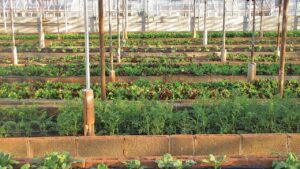“I see incorporation of seed as an investment in capacity building, allowing our international partners to enhance their own skills and programs focused on food security and ultimately economic development” says Jeff Boshart, Global Food Initiative manager and Emerging Global Mission Fund for the Elgin, Ill., Church of the Brethren. Boshart was born in Jos, Nigeria to parents who served as house parents and teachers at a missionary school. Not surprisingly, he possesses an inherent sensitivity to the need for helping others.
Boshart has shouldered a heavy load during the past five years. He credits much of his thinking about the technical side of agricultural development to an early-career ECHO internship opportunity, which evolved into a staff position. He spent time at Cornell University, studying Extension and educational approaches to community work.
His view of seed as a development tool makes both a philosophical and theological statement. Unlike many other faith-based organizations, the Church of the Brethren has not historically sought out non-governmental organizations (NGOs) as partners. Rather, as a church, they have chosen to work with other like-minded faith-based institutions and individuals.
Boshart previously served the Brethren holding the role of Haiti disaster response coordinator. Seed was integral to his approach to disaster relief following the devastating 2010 earthquake.
In the aftermath, food was delivered to Port au Prince. Boshart initially viewed this as a typical expression of international support; one where aid would first flow to those in urban areas and then trickle down to poorer relatives in rural areas. However, this earthquake turned the model on its head.
“We knew that many urban residents had already fled the city and living with family members in rural settings,” he says. “Those rural families and communities had to carry the burden of supporting their urban relatives from the onset. We provided dry (common) bean seed for planting in rural communities rather than direct food aid for urban areas.”
The Brethren’s decision to supply planting seed was greatly appreciated and proved highly effective.
“Religious leaders and faith-based institutions are, in many cases, the only functioning institutions of any type in rural areas. They fill the void that government or university agencies occupy in more developed countries,” says Boshart.
He explains that well-meaning efforts within the development community are sometimes absent a “big-picture view” and with adequate knowledge of agricultural best practices, newer seed options and other appropriate agricultural technologies. Such efforts, although well intentioned, tend to be less effective in the fight to eliminate rural poverty.
Faith-based organizations have on-the-ground relationships and robust levels of community trust, particularly in rural communities. “I use the analogy of faith-based organizations providing the hardware (people, organizational structure, staff, long-term memory, vehicles, etc.) that can be of great value to those who have the software (new seed technology, better agricultural inputs, more appropriately designed equipment, etc.),” says Boshart. He believes faith-based organizations help build trust within communities where people often are highly suspicious of outsiders.
His views of the role and value of seed in development resonates in northeastern Nigeria with key leaders of Ekklesiyar Yan’uwa a Nigeria. Loosely translated, the Hausa language term means Church of the Brethren. In their own words, Nigerian leaders say:
“Hunger and poverty will not be eradicated in Sub-Saharan Africa if seed is not given the most needed attention for its production.”, Kefas John
“The quality of seed is very crucial in any successful agribusiness. When one spends more on quality seed the profit is maximized.”, Salamatu Billi
And, according to retired Extension agent, Daniel Zafi, “The solution to the world’s current devastating hunger lies in planting good quality certified seeds.”
Faith-based development is not without its ups and downs. They all too often lack coordination with large-scale public and private programs. But because of his experience, Boshart will consider new approaches. Church of the Brethren has launched a Nigerian food security program, and it’s testing the waters by engaging larger, nontraditional capacity development partners. Change may be in the wind.













